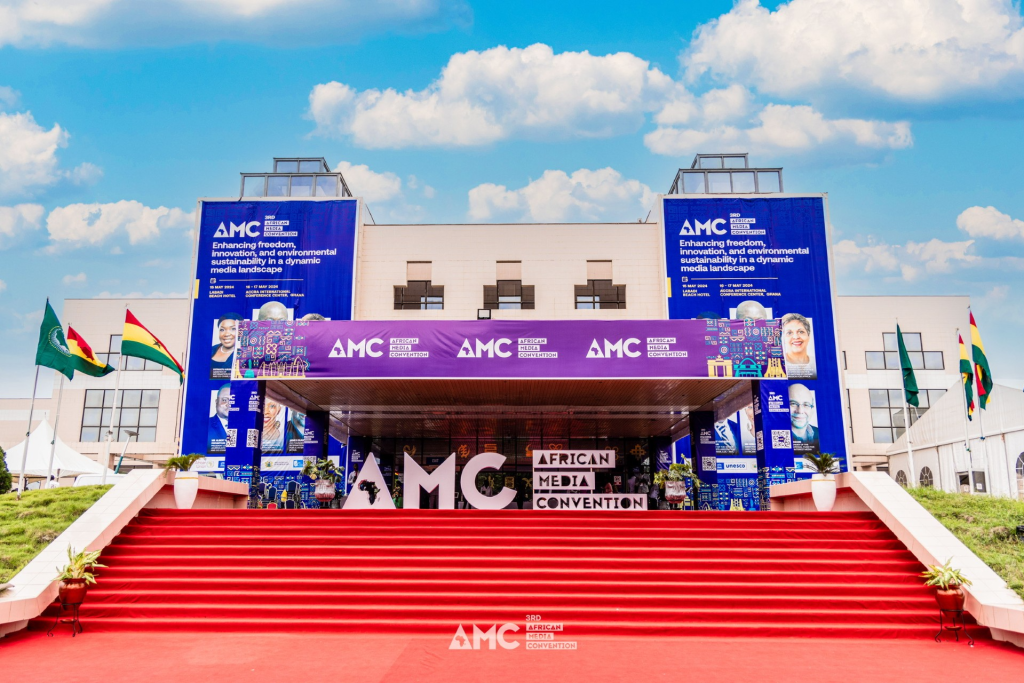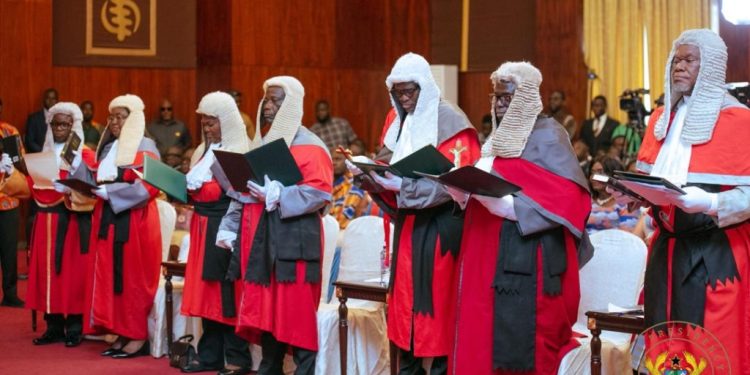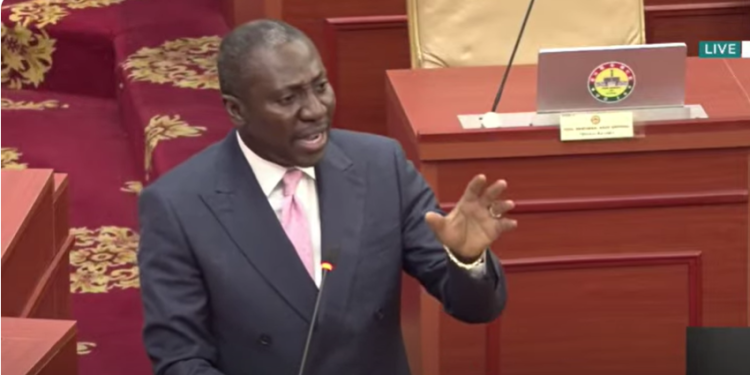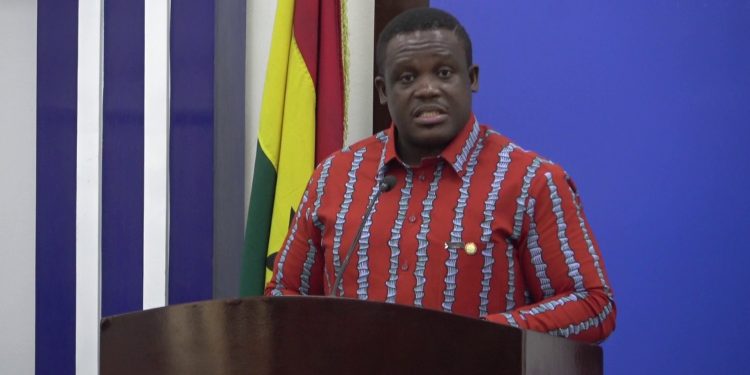 timer
timer
radio MAX
schedule UP NEXT: 15:40 - 5:40
Announcements
View All





Global Ghana News
View AllU.S. REAFFIRMS COMMITMENT TO STRONGER ECONOMIC TIES WITH GHANA The United States Government has reaffirmed its commitment to strengthening ties with Ghana, with a renewed focus on leveraging private sector partnerships to drive economic growth and create high-value, high-skilled jobs for Ghanaians. This assurance was given by the Deputy Head of Mission and Chargé d’Affaires at the U.S. Embassy, Rolf Olson, during a reception held in Accra on Friday, July 4, to mark the 249th Independence Day of the United States. In his remarks, Mr. Olson emphasised the growing potential for expanded trade and investment between the two countries, noting that stronger collaboration across sectors could unlock shared prosperity. “Whatever forms they may take, our mutual interests and partnerships in trade, security, health, and more will continue going forward in ways that are both familiar and that are new. Together, we can create increased prosperity for both our nations, building on our generations of connections between families and businesses.” He further underscored the importance of private sector-led growth, especially in key areas such as energy and mining, where U.S. assistance and expertise have long contributed to Ghana’s development. “We can build on the strong foundations that U.S. assistance helped construct by fostering increased private sector-led growth in energy, mining, and various other critical sectors of Ghana’s economy,” he added. Mr. Olson also highlighted the readiness of U.S. companies to invest further in Ghana, provided that favourable conditions are in place to support business operations. “The United States can help create high-skilled and high-value jobs, building on the innovation, ingenuity, and industriousness that have characterised U.S. companies, many of whom are here tonight who are eager to explore more business in and with Ghana when the conditions are favourable to investment,” he said. 4th July,2025
PALESTINE ACTION TO BE BANNED The home secretary will move to proscribe the Palestine Action group in the coming weeks, effectively branding them as a terrorist organisation, the BBC understands. Yvette Cooper is preparing a written statement to put before Parliament on Monday. The decision comes as a security review begins at military bases across the UK, after pro-Palestinian activists broke into RAF Brize Norton in Oxfordshire and sprayed two military planes with red paint. A spokesperson for Palestine Action said: "When our government fails to uphold their moral and legal obligations, it is the responsibility of ordinary citizens to take direct action." In a separate post on X, it said the group represented "every individual" who is opposed to Israel's military action in Gaza, adding: "If they want to ban us, they ban us all". Under UK law, the home secretary has the power to proscribe an organisation under the Terrorism Act 2000 if they believe it is "concerned with terrorism". If the group is proscribed it would become illegal to be a member or invite support for it. There are currently 81 groups proscribed as terrorist organisations in the UK under the Terrorism Act. Former Home Secretary Suella Braverman said the move to ban the group was "absolutely the correct decision". "We must have zero tolerance for terrorism," she wrote in a post on X. But Amnesty International UK said it was "deeply concerned at the use of counter terrorism powers to target protest groups." "Terrorism powers should never have been used to aggravate criminal charges against Palestine Action activists and they certainly shouldn't be used to ban them," it wrote on social media. Prime Minister Sir Keir Starmer earlier condemned Friday's incident as "disgraceful". The group's actions sparked outrage among some MPs, with Reform UK leader Nigel Farage and shadow justice secretary Robert Jenrick calling for the group to be banned. 1:28 Watch: BBC looks at how activists breached RAF base Brize Norton South East counter terrorism police earlier confirmed its specialist officers were investigating the incident alongside Thames Valley Police and the Ministry of Defence. Counter-terrorism police added the incident happened in the early hours of Friday and that enquiries were "ongoing to establish the exact circumstances". Footage posted online by Palestine Action showed two people inside the Oxfordshire airbase in darkness, with one riding on a scooter up to an Airbus Voyager and spraying paint into its jet engine. After sharing the footage, a spokesperson said: "Despite publicly condemning the Israeli government, Britain continues to send military cargo, fly spy planes over Gaza and refuel US and Israeli fighter jets." Greg Bagwell - a former RAF deputy commander and now a distinguished fellow at the Royal United Services Institute (Rusi) - told the BBC the aircraft targeted by the group "do not do what these protesters think they do. They're largely used for moving passengers or fuel". He added that Voyagers had "the wrong connectors" that would stop them being used to help refuel Israeli or US jets, as the action group suggested. But he said if the activists "wanted to create an effect - they've clearly done that". Since the start of the current war in Gaza, Palestine Action has engaged in activities that have predominantly targeted arms companies. In May, it claimed responsibility for the daubing of a US military plane in Ireland. RAF Brize Norton serves as the hub for UK strategic air transport and refuelling, including flights to RAF Akrotiri in Cyprus. The air force has conducted reconnaissance flights over Gaza out of the Cyprus base. 24th June,2025
FLIGHT EVACUATES BRITISH NATIONALS FROM ISRAEL The RAF has evacuated 63 British nationals and their dependants from Israel as the country continues to exchange fire with Iran, the foreign secretary has said. The flight left Tel Aviv on Monday afternoon, taking vulnerable Britons and their immediate family to Cyprus, from where they will be taken to the UK. A British national was also injured in Israel during an Iranian missile attack, David Lammy said. In a statement to MPs, Lammy repeated his plea to Iran to return to the negotiating table following the US's strikes on its nuclear programme. He said: "My message for Tehran was clear, take the off ramp, dial this thing down, and negotiate with the United States seriously and immediately. "Be in no doubt, we are prepared to defend our personnel, our assets and those of our allies and partners." Iran's supreme leader Ayatollah Ali Khamenei said Iran would not accept aggression "from anyone under any circumstances". Follow live coverage of the Israel-Iran conflict The RAF A400 aircraft departed Tel Aviv's Ben Gurion Airport with 63 passengers, made up of British nationals plus their immediate family, who are eligible to travel, Lammy said. The BBC understands the UK's Chief Rabbi, Sir Ephraim Mirvis, is one of the passengers. The Foreign Office said further flights would be based on demand and the security situation. British nationals still in Israel have been urged to register their presence with the UK government. Downing Street said "around 1,000" people had asked for a seat on an evacuation flight – a quarter of the 4,000 who have registered their presence in Israel or the Occupied Palestinian Territories with the Foreign Office. Israeli airspace has been closed - leaving thousands of British nationals stranded - since the conflict started earlier this month when Israel attacked nuclear sites in Iran, prompting Tehran to respond with missile strikes. SWNS Taken from behind, a group of people stand at the back of a plane which has a large ramp open. They have luggage, and soldiers help them on board.SWNS British nationals and their families were flown to Cyprus from Israel British citizen Gabriella Somerville, 58, told PA news agency that the situation is "really difficult" as she tries to find a way to leave Israel. She said she had registered and paid for a British evacuation flight, but had heard no updates. "We've been here 10 days now and most other countries have had secure coaches to get to the border with Egypt or Oman or Jordan," she said. "Yet we were told by the Foreign Office to make our own way to the borders. "I really feel for the people out here now. It's really difficult, we've been going down to shelters for 10 days and we're living out of packed suitcases but with no communication." Elsewhere, British nationals in Qatar were advised to shelter in place on Monday evening, shortly before Iran launched missiles at the US al-Udeid Air Base near Doha. The advice was later lifted following the attack. All UK military personnel in Qatar were accounted for, the BBC understands, and there were no injuries or casualties as a result of the attack, according to the Qatari government. The airspace over the country was closed temporarily and flights grounded. A BBC News employee at Doha airport said he had got on a plane headed for Bangladesh on Monday afternoon, but the plane's journey was then delayed and its passengers removed and made to wait at the airport. 24th June,2025
MIGRANT DETENTION CENTRE Florida has begun building a detention centre - dubbed the 'Alligator Alcatraz' - to temporarily hold migrants on an air strip in the Everglades. Department of Homeland Security Secretary Kristi Noem said the facility would be funded "in large part" by the Federal Emergency Management Agency's shelter and services programme, which was previously used to provide accommodation and other aid for undocumented migrants. The plan has been criticised by several lawmakers, including the mayor of Miami-Dade County, who argued it could be environmentally "devastating". The proposal comes as Trump tries to deliver on a campaign pledge to ramp up deportations of illegal migrants. "Under President Trump's leadership, we are working at turbo speed on cost-effective and innovative ways to deliver on the American people's mandate for mass deportations of criminal illegal aliens," Noem said in a statement. "We will expand facilities and bed space in just days, thanks to our partnership with Florida." The facility is to be built on the site of the Dade-Collier Training and Transition Airport, a public airport around 58km (36 miles) from Miami. It will cost about $450m (£332m) a year to run. In a video posted on X, Florida's Attorney General James Uthmeier called the airport a "virtually abandoned facility". He said the detention centre could be built in 30 to 60 days and hold an estimated 1,000 people. He argued the location acted as a natural deterrent for escapees. Uthmeier said in the video: "[If] people, get out, there's not much waiting for them other than alligators and pythons. Nowhere to go, nowhere to hide." The mayor of Miami-Dade County, Daniela Levine Cava, a Democrat, criticised the plan, saying "the impacts to the Everglades ecosystem could be devastating". The Florida Everglades are a unique environmental region comprising marshes, prairies, forests, mangroves and estuaries. Uthmeier said the facility would not be located within Everglades National Park. 24th June,2025
Local Ghana News
View AllGHANA WELCOMED 1.29M VISITORS IN 2024; 22.4% CAME FOR BUSINESS Ghana welcomed 1,288,804 international visitors in 2024, representing a 12% year-on-year increase as the country maintained its status as one of West Africa’s top travel destinations. According to the 2024 Tourism Report by the Ghana Tourism Authority (GTA), 22.43% of these visitors came for business, making it the leading reason for travel to Ghana last year. Study or teaching recorded (7,06%), visits to family and friends (22.29%), and holidays or vacations (22.15%) — showing a near-even distribution across the top four travel motivations. Other reasons included conferences, cultural events, sports, and transit. The majority of international arrivals — over 1.13 million — entered the country through Kotoka International Airport, while Aflao, Elubo, and Paga also served as notable land entry points. In terms of visitor origin, the United States led with 137,862 arrivals, followed by Nigeria with 111,581, and the United Kingdom with 52,845. These three countries accounted for a significant share of Ghana’s inbound traffic, reinforcing the country’s strong ties to the diaspora and business communities abroad. Perceptions of Ghana remained overwhelmingly positive. A striking 88% of international respondents described Ghana as an “ideal tourism destination,” citing Ghanaian hospitality (94%), cultural heritage (39%), local cuisine (28%), and safety (39%) as key attributes that shaped their experiences. Visitor satisfaction was equally strong, with 78% rating their overall experience as excellent, and high scores recorded for tour guide services, restaurants, wildlife attractions, and historical sites such as forts and castles. As global tourism steadies following pandemic-related disruptions, Ghana’s continued growth will depend on improved infrastructure, better service delivery, and the strategic promotion of its rich cultural offerings. The GTA believes these factors, combined with data-driven policy and investment, can firmly position Ghana as a preferred destination for both business and leisure travellers in Africa. 4th July,2025
RECONSTITUTED FSC CHARTS ROADMAP TO SAFEGUARD ECONOMY The newly reconstituted Financial Stability Advisory Council (FSC) has held its maiden meeting, reaffirming its commitment to safeguarding Ghana’s financial system amid ongoing sector recovery efforts. The meeting, which took place on June 9, also marked the 22nd session of the FSC since its establishment in 2018. The Council was reconstituted by an Executive Instrument in accordance with Article 58 of the Constitution. Chaired by the Governor of the Bank of Ghana, Dr. Johnson Pandit Asiama, the Council includes key financial sector leaders: Mrs. Matilda Asante-Asiedu, Deputy Governor of the BoG (Financial Stability); Hon. Thomas Nyarko Ampem, Deputy Minister of Finance (Financial Sector); Dr. Abiba Zakariah, Acting Commissioner, National Insurance Commission; Dr. James Klutse Avedzi, Acting Director-General, Securities and Exchange Commission; Mr. Christopher Boadi-Mensah, CEO of the National Pensions Regulatory Authority; and Mr. Galahad Alex Andoh, Acting CEO of the Ghana Deposit Protection Corporation. During the session, the Council discussed key issues aimed at strengthening Ghana’s financial sector, including: Progress made in rebuilding capital buffers critical to sustaining recovery; Updates on initiatives addressing legacy challenges within the sector; and Strategic plans to bolster the FSC’s oversight and collaborative functions. The Council underscored the need for enhanced institutional coordination and proactive regulation to promote a resilient, inclusive, and stable financial system capable of supporting long-term economic growth. Dr. Asiama highlighted the importance of a sound and innovative financial sector that effectively supports the real economy. The FSC was established to coordinate regulatory activities, identify systemic risks, and strengthen crisis preparedness. It is supported by a Technical Committee and three working groups dedicated to its core mandates. 4th July,2025
RESIDENTS TO HIT THE STREETS JULY 12 OVER ABANDONED OFANKOR-NSAWAM ROAD PROJECT Residents of Nsawam and Amasaman have announced a planned demonstration for Saturday, July 12, to demand urgent attention to the deplorable state of the Ofankor–Nsawam road, which they say has become a source of daily suffering and economic hardship. The planned protest, initially scheduled for Monday, June 30 was rescheduled after consultations with the police. Convenor of the demonstration, Nana Kusi Afriyie, disclosed on Channel One TV’s Breakfast Daily on Friday, July 4, that the demonstration will now take place on Saturday to allow for adequate security arrangements. “We were planning to have the demonstration on Monday, but the security service said they had other engagements, so they proposed a shift to Saturday. Our membership is over 1,700. We have also engaged the GPRTU, concerned drivers, and drivers in Nsawam and Amasaman. So we have the numbers,” he stated. He explained that the demonstration will proceed to Amasaman Stadium Junction, where protestors will present a petition to the Member of Parliament for Amasaman. Residents say the road project, which began in 2023, has seen little progress, leaving the stretch plagued by dust, potholes, and daily heavy traffic. A visit by Channel One News on Thursday, July 3, captured dozens of stranded passengers struggling to find commercial vehicles. Many were seen trekking long distances, visibly tired and frustrated. Locals accused the government and relevant agencies of dragging their feet despite repeated assurances. They say the stalled construction is disrupting businesses, school attendance, and the general well-being of affected communities. 4th July,2025
GOVT RELEASES $300M FOR EUROBOND COUPON PAYMENT The Government of Ghana has disbursed $300 million to fulfil its restructured Eurobond debt obligations, with coupon payments scheduled to be made today, July 3, 2025. The transaction is being facilitated by the Bank of Ghana in collaboration with its correspondent banking partners in Europe and the United States, targeting bondholders who participated in the country’s debt exchange programme. The local currency equivalent of the amount had earlier been transferred to the central bank to support the remittance. The funds, sourced from the government’s dedicated Debt Service Accounts, signal Ghana’s continued commitment to meeting its financial obligations following the successful Eurobond Debt Exchange Programme concluded last year. A subsequent coupon payment is expected in August 2025 as part of the ongoing repayment schedule. Ghana resumed Eurobond repayments in October 2024 after reaching an agreement with creditors to restructure approximately $13 billion in Eurobond liabilities. The deal enabled staggered repayments, with a total of $520 million paid out in 2024, including a $120 million consent fee to encourage bondholder participation. Since then, the current administration led by President John Dramani Mahama has upheld the revised terms, continuing with timely debt servicing under the restructured framework. While Eurobond repayments are underway, the government is expected to begin servicing its bilateral debts from 2026. Market watchers believe this latest payment – Ghana’s third since the restructuring deal could bolster the country’s sovereign credit profile, improve investor confidence, and help lower borrowing costs over the medium term. 4th July,2025
